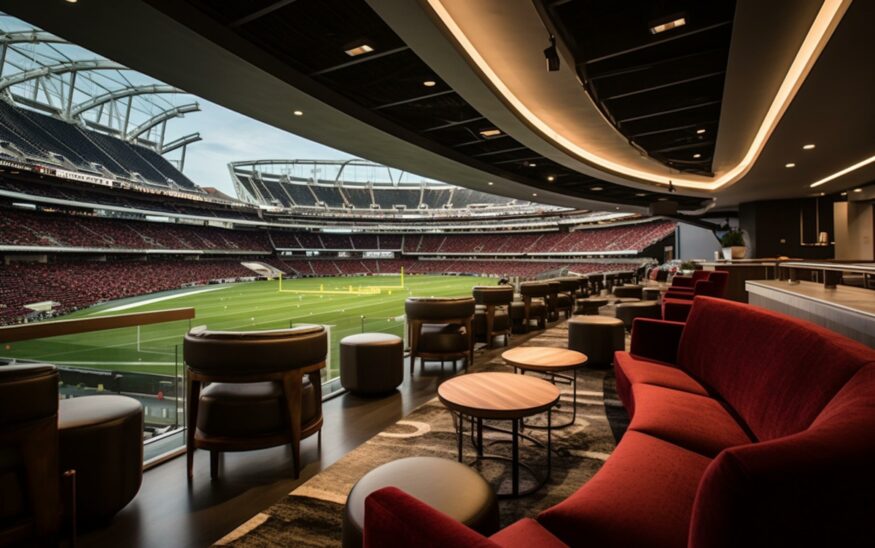Is the Future of Luxury Sports Suites Less… Luxury? Or Just More Practical?
How membership clubs, smaller suites and reconfigured seating areas are changing Colorado’s sports game.
Stewart Schley //November 27, 2023//


Is the Future of Luxury Sports Suites Less… Luxury? Or Just More Practical?
How membership clubs, smaller suites and reconfigured seating areas are changing Colorado’s sports game.
Stewart Schley //November 27, 2023//
The Broncos are down by seven against the Texans with just 12 minutes to go, but Russell Wilson and Co. are on the march, staring down a first-and-ten on the opponent’s 22-yard line. On the lookout for a one-on-one matchup, Wilson scans the defense. And then sees it: Wideout Eric Saubert, lined up in the slot position, covered by a lone linebacker. As the ball is snapped, with the clock ticking and the game on the line, it’s decision time: Make one last visit to the build-your-own sandwich bar, or snag a custom-decorated Broncos cookie?
Welcome to NFL football, suite-style.
READ: Navigating Sports Politics as College Football Evolves — CU Buffs Aim High
For 30 or so high-achieving sales representatives being feted by their employer, the game-day experience on this September afternoon is far removed from the raucous fandom happening in the stands below and above their section 200 enclave. Inside this leather-meets-polished steel suite, nobody’s getting foam-sprayed by a stranger’s beer as Wilson lobs a touchdown pass to Saubert. Instead, the fans all know each other, the environs are climate-controlled, the seats are wide and the drinks are free — or at least, already paid for by the boss. When the game’s over — the Broncos end up winning 16-9 — guests exit clutching customized jerseys and a gift bag stuffed with logo-ized water bottles and game-day towels. Shwag in hand, they’re whisked down a private elevator to a waiting attendant who squires them to a reserved car — air conditioner billowing — for a quick getaway. Life here is suite, indeed.
At least it is for those who get an invite. “For most people, it’s a once-in-a-lifetime experience,” says Allison Farrar Welch. “It’s not every day you can go to a luxury suite for a pro game.”
Farrar Welch’s Denver-based event-management and personal concierge company, As You Wish, arranged the behind-the-scenes maneuvering for last September’s home opener, handling everything from hiring drivers to arranging babysitters to ordering the customized jerseys. The rest, including the suite, the air conditioning, the plush leather seats and the ever-smiling attendants, was supplied by a Denver Broncos organization that, like its NFL peers, is determined to make the premium-seating experience a bigger-than-ever part of the team’s economic calculus.
READ: Live from Colorado — The Future of Sports Betting
“It’s another revenue stream, and if they do it correctly, teams can make so much money on the markup,” says Kelly Evans, an assistant professor within Metropolitan State University’s Sports Management program.
To her point, private suites and new members-only stadium clubs represent a bet that teams can improve average revenue-per-patron numbers by elevating the game-day experience for a selected cadre of fans and the organizations they work for. For example, 20-person suites for Colorado Avalanche games generally price out at anywhere from $5,000 to $10,000, depending on service levels, according to listings maintained by Suite Experience Group, a national sports-suite broker. Even at the low end, the price point works out to at least $250 per patron, more than twice the average ticket price for an Avs game, as calculated by ticket seller Seat Geek. At the upper end, the price per fan can quadruple.
Teams understand the math and are eager to take advantage. New possibilities for reconfigured suites and other forms of premium seating represent some of the impetus behind a $100 million upgrade for Empower Field, and could even lead to a possible relocation to a new stadium for the Broncos altogether. Operators of other local sports venues including Ball Arena, Coors Field and Dick’s Sporting Goods Park are playing the same game by reconfiguring older, stodgier suites into zippier, modernized spaces. They’re also building premium club environments and rethinking the way they price, present and market premium seats.
“Teams are getting deeper, and more creative,” says Scott Spencer, founder and CEO of Suite Experience Group. “The definition of ‘premium’ has really changed.”
One of the latest examples locally is the Breckenridge Bourbon Club, a 9,000-square-foot eating, drinking and mingling space just above field level on the east side of Empower Field at Mile High. Starting this season, the new space opens for business along with the stadium’s other two posh clubs, the 5280 Club and the United Club. The Breckenridge Bourbon club is available to season ticket holders who pay a premium for admission to the well-appointed gathering spot for enjoying the action, schmoozing things up, and sipping the “official bourbon of the Denver Broncos.”
Sponsored by the Colorado-based Breckenridge Distillery, the club delivers what the Broncos and just about every NFL team want: higher per-ticket revenue, financial backing from a like-minded sponsor, and an opportunity to signal that the team is very much open for business. Reflecting the importance of the new venue and the category it represents was the close attention to the club’s architectural design contributed by team co-owner Carrie Walton Penner, who worked closely with design teams and with Breckenridge Distillery founder Bryan Nolt on a space that aims to blend a “swanky” aesthetic (Nolt’s word) with an energetic “mountain” feel. “Carrie was just really dialed in on getting the design and the mojo right,” Nolt said.
READ: Altitude Vs. Comcast — The Changing Economy of Sports Media
Premium seating in the form of redesigned suites and private clubs like Nolt’s is important for a new generation of sports team owners who have moved beyond a bygone economic formula: buy a team, lose money for years while taking advantage of tax write-offs, and then cash out by finding an eager buyer down the road. The modern approach, instead, is to run prized sports assets with much more attention to the real-time P&L statement. The greater the profit, the more leeway to invest in players, coaches, facilities and resources. And possibly, to win more games.
But building suites is different than populating them; it takes year-round marketing and salesmanship to keep the sellout levels where owners want them to be. Each of Denver’s major professional teams, along with the University of Colorado and other area colleges, maintains full-time staff devoted to marketing premium suites and premium clubs to patrons.
The tactics here have been shifting lately. Traditional selling techniques — chatting up prospects, making cold calls, sending out brochures, identifying leads, closing deals — are now intertwined with newer e-commerce avenues and a thriving secondary lease market. A handful of independent brokers have popped up to showcase available suites controlled either by teams themselves, or by long-term lessees who aren’t always able to get things together to fill a suite on game day. Roam through the website maintained by the Colorado-based company SuiteHop and you’ll find hundreds of premium suite listings across the country, along with published prices. A few clicks and a ping to the credit card, and your suite awaits.
SuiteHop’s CEO Todd Lindenbaum, who started the company from a Denver LoDo office in 2008, says e-commerce has become a major force in the secondary suites market. Before the COVID crisis, most of Lindenbaum’s business came from selling luxury sports suite rentals the old-fashioned way to business clients like banks, law and accounting firms. Now, the ratio is turned upside down: Close to two-thirds of SuiteHop’s revenue comes from one-off transactions with individuals who roam the web for deals. Suite Experience Group, a competitor in the secondary suites market, has seen a similar trend, with direct-to-consumer transactions now far more common, says CEO Spencer.
Budget range
For Colorado companies looking to entertain, a wide array of possibilities and budget levels awaits. Farrar Welch’s Denver-based client spent close to $30,000 last fall to entertain its top salespeople at the Broncos home opener, a sum that spanned the suite rental itself plus accompanying accouterments and support. The price wasn’t cheap, but it represents a bargain compared with the other extreme: A private suite was recently listed online for the 2024 NFL Super Bowl just outside Las Vegas with an asking price of $1.5 million.
Happily for budget-watchers, it’s possible to book premium seating for Colorado sports events for a much lower outlay. One example comes from Dick’s Sporting Goods Park, home to the Colorado Rapids of Major League Soccer, which can outfit a small party with a private suite experience offering an expansive field view for as little as $2,500, inclusive of food and non-alcoholic beverages (they’re available, but for an upcharge).
That offering is part of a wholesale rethinking of how the Rapids and its parent company Kroenke Sports & Entertainment are approaching the broader premium category. Nate Christiansen, a vice president for Kroenke Sports, says the strategy is to widen the field of play by making premium seating more diverse and more affordable for smaller firms, families and groups that want to get in on the good times and the great views without breaking the bank. Among recent stadium improvements, the Rapids organization carved out space within its “Northern Boundary” area for a new “Mesa” area offering private tabletop reservations that give parties of four people an expansive field view and food/beverage service from a dedicated attendant.
READ: The Business of Sports — Uniting Colorado
Similar thinking – devising ways to broaden the premium seating category – was behind the popular Lexus Club at Kroenke’s Ball Arena, and the creation at Ball Arena of new loge boxes that exist somewhere between a normal arena ticket and a dedicated suite. A like-minded approach also has taken hold at Coors Field, where the Colorado Rockies renovated all of the team’s infield suites for the 2023 season, modifying the interior décor of spaces accommodating anywhere from 12 to 60 takers, and integrating food and beverage packages into an all-in-one price advertised at $200 per person. At the same time, the Rockies continued to welcome fans to the Rooftop Club that lords over right field as a popular social watering hole. The Rooftop hangout, along with the End Zone space created by Kroenke Sports for Colorado Mammoth games, serves a clear purpose, points out Metro State University’s Evans: playing to a younger demographic cohort that’s more attuned to socializing and party experiences than the classic suite-holders of old. “These are social spaces where strangers can meet like at a bar, and create Instagram-able moments,” she says.
To be sure, suites, party places and stadium clubs aren’t for everybody. Some hard-core fans find watching a game from a private suite to be a stretch too removed from the action on the field or the ice. “It’s like you’re watching a game at a hotel room, but there’s no bed,” one critic posted on the online message board Reddit.
Maybe so, but rising demand for suite space suggests there’s plenty of willingness to partake of the good life at the ballpark, arena or stadium. In interviews, several sector participants identified the same factor in this demand equation: the socialization possibilities of private sports suites and clubs. Hobnobbing with salespeople, clients and vendors has become more important, they said, in a business environment where many workers are spending at least some days at home in the post-COVID reality, isolated from co-workers and business partners.
“Business is a contact sport,” says Jeff Morander, CEO of the Association of Luxury Suite Directors, representing teams, stadium operators and suite sellers. “Where else can you entertain that many people in a private space and dial up food and beverages?” Spencer of Suite Experience Group echoes the point, saying premium live-sports environments offer a networking experience that’s tough to match with stuffy business dinners or conference sessions. “Say you’re trying to woo the CFO of a company,” Spencer says. “If you invite that person and their family to an NFL game on a Sunday, they’re much more likely to say ‘yes’ than to Tuesday dinner at a steakhouse.”
Even though demand for schmoozing may be on the rise, suite sellers have long memories of earlier pressures that led to a recalculation of the category. By 2015 or so, a combination of some over-zealous salesmanship and second thoughts about corporate budgets had produced sagging renewal rates on pricey leases across U.S. sports venues. That led to a visual nobody wanted to see: vacant suites. “People would look up and see suites empty,” says Lindenbaum. “That’s not good for business. “
It’s because of this that stadium and team owners have been shifting their points of emphasis. A common remedy has been to pivot away from super-sized suites hosting 40 or more people, to smaller, more affordable suites where companies can pare down the invite lists, or save money by sharing the space with another organization: same suite, different companies.
At Dick’s Sporting Goods Park, for example, what used to be an arrangement of traditional suites has been converted to the Summit Club, where access to a private area with a buffet, carving table, beer and wine plus valet parking can be reserved by as few as two individuals. Similar redeployments are happening elsewhere. Overall, “we’ve seen a lot of shrinking of the inventory of the traditional suite,” Lindenbaum says.
Coupled with this migration to smaller physical spaces has been a move to all-inclusive, fixed-price models where everything from beer and wine to snacks and meals is known up front. “Once you show up, you won’t have to take your wallet out of your pocket,” says Kroenke Sports’ Christiansen. There’s been a related recalculation on the season-longevity front: Besides moving to all-inclusive pricing, teams have also been more willing to offer pared-down game packages for suite holders rather than ask clients to pay big amounts up front for entire seasons.
READ: How the Name, Image, Likeness (NIL) Revolution is Changing the World of College Sports
Cowboy heritage
The wider range of sizes, prices and options reflects a premium seating category that’s shape-shifting its way out of an earlier era. When he oversaw the completion of the imposing Cowboys Stadium (now AT&T Stadium) in 2009, Dallas Cowboys owner Jerry Jones ignited a surge of investment in luxury suites. Not lost on NFL owners was that Jones was able to keep most of the suite money himself, using proceeds from multi-year suite licenses to support debt-service payments on the palatial building. The message was unmistakable: Suites were suddenly very much a thing in modern sports economics.
Plenty of teams piled on. But over time, poor rates of renewal, keener corporate scrutiny of budgets, and later, the COVID crisis, forced the current re-thinking, and the move to a wider array of premium sports seating possibilities.
Today, suites are still widely available across Colorado’s major sports franchises. But now, increasing premium seating action is occurring in the “club” sector, where destinations like Ball Arena’s Lexus Club, the Rockies new Legacy Club embedded behind home plate, and the new Breckenridge Bourbon Club at Empower Field represent a newer twist on the premium-seat economy, offering a larger expanse of real estate and lower entry costs per fan than dedicated suites, but preserving the members-only vibe.
 Stewart Schley writes about sports, media and technology from Denver. Read this and Schley’s past columns on the Web at cobizmag.com and email him at [email protected]
Stewart Schley writes about sports, media and technology from Denver. Read this and Schley’s past columns on the Web at cobizmag.com and email him at [email protected]

























